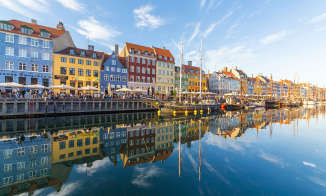Continue reading “The Euro Elite 2021: Keeping the cogs turning”
The Euro Elite overview: Enduring endurance
Much of the narrative of Legal Business for the past 300 issues has involved the internationalisation – and the failed internationalisation – of the UK-based global firms. When I started out in legal journalism in the late ‘90s, the activity of the major Anglo-Saxon firms in mainland Europe was at its peak. Many, like White & Case and Weil, Gotshal & Manges and CMS, had cut a swathe through Central and Eastern Europe, positioning themselves to take advantage of the wave of privatisations in new independent nations such as the Czech Republic and Romania following the collapse of the Berlin Wall. But the really bloody battles (in a law firm context) were taking place in some of the key markets of France, Germany, Benelux and Italy, where the Magic Circle firms were regularly putting noses out of joint at an alarming rate by either trying to take over leading firms or just hire as many of their key corporate partners as they could.
I witnessed first hand some shockingly arrogant behaviour from senior individuals towards what are now Euro Elite firms. Once, at the launch of a new initiative combining a number of key European firms, I saw one UK management figure sniggering as his German counterpart gave a speech in English. In an interview in Madrid with the fabulously charismatic founding partner of Uría & Menéndez, Rodrigo Uría González, he recalled having to get armed guards to eject from his office a particularly truculent London-based partner trying far too hard to get Uría on board in another hare-brained European alliance. Continue reading “The Euro Elite overview: Enduring endurance”
Euro Elite: Baltics – Small yet spirited
Often overlooked, the Baltics is fast becoming one of the most exciting tech startup hubs in Europe. Home to only roughly six million people, the countries of Estonia, Lithuania and Latvia have the largest number of startups per capita in Central and Eastern Europe and the venture capital firm Index Ventures has rated these countries as the most ‘startup-friendly’ in Europe, largely owing to policies on stock options, tax, employment and a low cost of living.
One remarkable statistic is that since Brexit, Lithuania is now the largest fintech hub in the EU and in some cases is actually moving investment from the UK to Lithuania. Continue reading “Euro Elite: Baltics – Small yet spirited”
Euro Elite: Benelux – Reasons to be cheerful
Notwithstanding the macro-level impact of Covid-19 globally, independent firms in the Benelux region have adapted to evolving conditions with remarkable fortitude. At Stibbe, for example, there have been tangible reasons for cheer. According to its managing partner, Wouter Ghijsels: ‘The firm is growing, and the lateral hires and promotions of the past year across the Benelux are a testament to that. Overall, we have had an increasingly successful year across all practices,’ he says.
Equally, Loyens & Loeff has been another success story. Says its Netherlands managing partner, Bram Linnartz: ‘Our firm succeeded in adapting to the ever-changing circumstances and continued to grow at a tremendous pace’. This was helped by the firm establishing a dedicated incident and crisis management team to safeguard the workforce and handle the challenges of the coronavirus crisis. Continue reading “Euro Elite: Benelux – Reasons to be cheerful”
Euro Elite: CEE – Finding the middle ground
The general picture is one of uncertainty across the diverse CEE region; while there was an initial slowdown last year across the board, transactions did pick up towards the end of 2020 in certain sectors. Lawyers report having been busy throughout the year, with Q2 necessitating more of a focus on restructurings and Q4 seeing a return to more usual flows of activity.
Overall, the year can be said to have been defined by volatility. Observing the pace of change, Dragan Karanović, the Serbian-based managing partner of Karanovic & Partners, reflects: ‘It used to be year-on-year, then quarter-on-quarter, and now it’s almost week-by-week.’ Continue reading “Euro Elite: CEE – Finding the middle ground”
Euro Elite: Germany – Flight to quality
Past experience, such as the financial crisis in 2008/09, has shown that the German legal market is robust. Today, in the midst of the Covid-19 pandemic, independent law firms are therefore largely confident that the market will remain stable and reasonably active.
This is not to say that the pandemic has not had an impact. Indeed, it is viewed by some as marking the end of the economic boom of the past decade. While the German government is keeping companies liquid by injecting cheap money into the economy, future consequences are still difficult to assess. Germany’s GDP fell by 5% in 2020, a shade less than analysts’ predictions and during the worst contraction of -5.7% in 2009. The economy has also fared relatively well compared with some other European nations. Continue reading “Euro Elite: Germany – Flight to quality”
Euro Elite: Iberia – Stronger together
Iberia’s all-important tourism and hospitality sectors have taken a hit during the pandemic, and continued restrictions mean it could be some time before international holidaymakers are able to return. While Covid-19 has brought unique challenges, independent law firms in the region were already facing tough competition from global players and the Big Four accounting firms.
In Spain, the elite independent firms are well established, but so too are some of their biggest international competitors, including Allen & Overy, Clifford Chance and Linklaters. ‘The Spanish legal sector is very robust due to its competitiveness,’ notes Salvador Sánchez-Terán, managing partner at Iberian heavyweight Uría Menéndez. ‘Full-service firms such as ours are able to cope with crisis situations rather well, as our business is generated by clients requiring assistance from multiple practice areas.’ Continue reading “Euro Elite: Iberia – Stronger together”
Euro Elite: Ireland – All-comers welcome?
Despite the ongoing Covid-19 crisis, Ireland’s independent legal market has reason for optimism: the Irish economy is expected to be one of the most resilient in the EU, according to November 2020 forecasts by the EU Commission, with GDP expected to return to growth in 2021. This is largely thanks to the country’s thriving life sciences and technology sectors and the presence of numerous major multinationals – among them Apple, Facebook, Google, Microsoft, GlaxoSmithKline and Pfizer – which have their European headquarters in Dublin and in the south and west of Ireland. As a result, production and exports, particularly of medicinal products and computer services, have remained strong.
‘Client activity has remained robust during this time, despite the uncertainty,’ explains Owen O’Sullivan, recently appointed managing partner at William Fry. ‘While it’s true that most sectors are facing challenges, especially those directly impacted by physical-distancing measures, such as tourism, travel, retail, hospitality and live events, other sectors are enjoying significant demand and growth at this time – for example, healthcare, retail grocery, and online entertainment and communications.’ Continue reading “Euro Elite: Ireland – All-comers welcome?”
Euro Elite: Italy – Forza Italia
The Italian market differs deeply from other European legal markets in one key regard: international firms are spread wide throughout Italy, but are often only selectively present in the market. Many of them are either strong only in specific areas or had to resort to sporadic lateral hires in order to offer a full-service, to the detriment of a cohesive team and vision. Accordingly, it is the independent firms that are often seen as the true market force.
BonelliErede and Chiomenti, as well as Gianni & Origoni and Legance, account for a significant chunk of the market. Armed with this strength, Chiomenti’s managing partner Filippo Modulo is well pleased with the past year’s performance and does not seem concerned about the future. With businesses and finance up and running, and capital as available as ever, 2020 was for a record year for Chiomenti. When asked about the next 12 months and possible downturns or recessions, his answer is clear: the question is misplaced. Continue reading “Euro Elite: Italy – Forza Italia”
Euro Elite: Nordics – Solid states
Despite varying governmental approaches to the coronavirus response across the Nordics, there is a consistent optimism throughout the region, both with regards to what 2021 holds and also the overarching impact of the virus on the markets in the long term.
‘Largely, and perhaps surprisingly, the feeling is that it has been business as usual,’ states Gorrissen Federspiel’s managing partner Martin André Dittmer of the Danish market. ‘When the pandemic broke, there was a lot of uncertainty around how the market would respond and how businesses would navigate the situation. But once the initial shock had subsided, what we mostly experienced was a focus on government relief packages and issues relating to employers’ legal obligations.’ Continue reading “Euro Elite: Nordics – Solid states”















